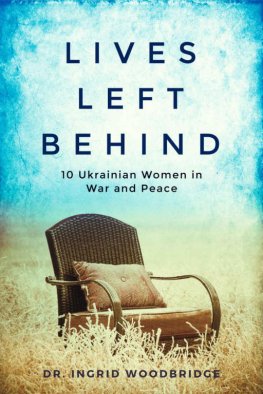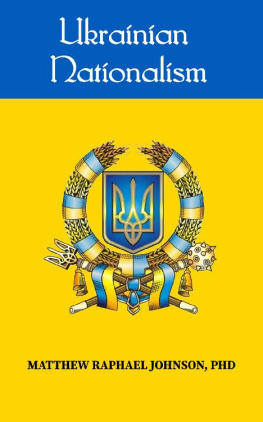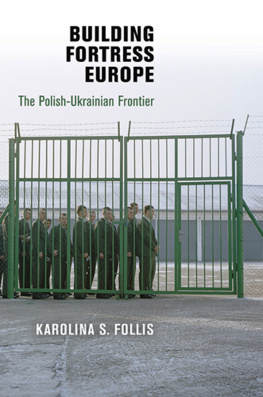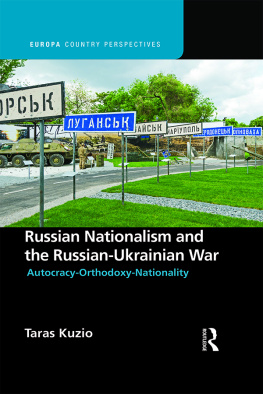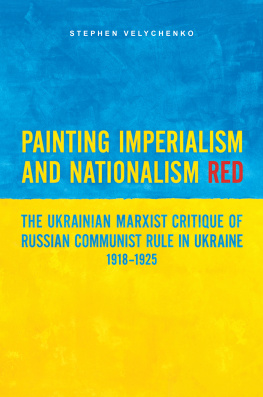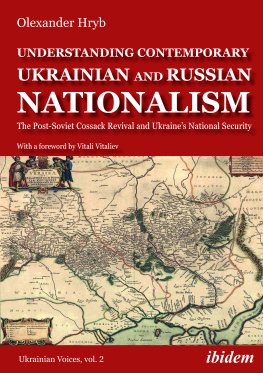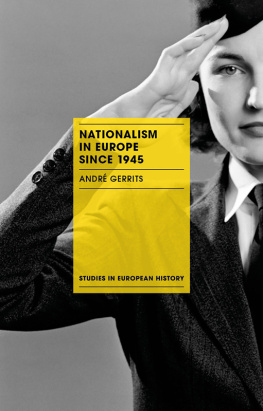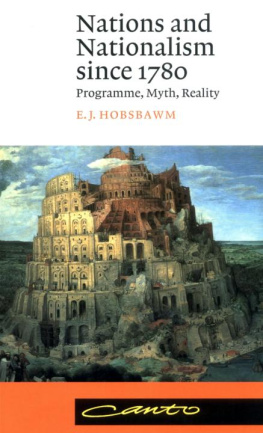Bilenʹkyĭ - Romantic nationalism in Eastern Europe Russian, Polish, and Ukrainian political imaginations
Here you can read online Bilenʹkyĭ - Romantic nationalism in Eastern Europe Russian, Polish, and Ukrainian political imaginations full text of the book (entire story) in english for free. Download pdf and epub, get meaning, cover and reviews about this ebook. City: Polen;Russland;Ukraine, year: 2012, publisher: Stanford University Press, genre: Politics. Description of the work, (preface) as well as reviews are available. Best literature library LitArk.com created for fans of good reading and offers a wide selection of genres:
Romance novel
Science fiction
Adventure
Detective
Science
History
Home and family
Prose
Art
Politics
Computer
Non-fiction
Religion
Business
Children
Humor
Choose a favorite category and find really read worthwhile books. Enjoy immersion in the world of imagination, feel the emotions of the characters or learn something new for yourself, make an fascinating discovery.

Romantic nationalism in Eastern Europe Russian, Polish, and Ukrainian political imaginations: summary, description and annotation
We offer to read an annotation, description, summary or preface (depends on what the author of the book "Romantic nationalism in Eastern Europe Russian, Polish, and Ukrainian political imaginations" wrote himself). If you haven't found the necessary information about the book — write in the comments, we will try to find it.
Bilenʹkyĭ: author's other books
Who wrote Romantic nationalism in Eastern Europe Russian, Polish, and Ukrainian political imaginations? Find out the surname, the name of the author of the book and a list of all author's works by series.
Romantic nationalism in Eastern Europe Russian, Polish, and Ukrainian political imaginations — read online for free the complete book (whole text) full work
Below is the text of the book, divided by pages. System saving the place of the last page read, allows you to conveniently read the book "Romantic nationalism in Eastern Europe Russian, Polish, and Ukrainian political imaginations" online for free, without having to search again every time where you left off. Put a bookmark, and you can go to the page where you finished reading at any time.
Font size:
Interval:
Bookmark:
Stanford Studies on Central and Eastern Europe
Edited by Norman Naimark and Larry Wolff
Romantic Nationalism in Eastern Europe
Russian, Polish, and Ukrainian Political Imaginations
Serhiy Bilenky
Stanford University Press
Stanford, California
Stanford University Press
Stanford, California
2012 by the Board of Trustees of the Leland Stanford Junior University.
All rights reserved.
Published with the assistance of the Edgar M. Kahn Memorial Fund.
No part of this book may be reproduced or transmitted in any form or by any means, electronic or mechanical, including photocopying and recording, or in any information storage or retrieval system without the prior written permission of Stanford University Press.
Printed in the United States of America on acid-free, archival-quality paper
Library of Congress Cataloging-in-Publication Data
Bilenkyi, Serhii, author.
Romantic nationalism in Eastern Europe : Russian, Polish, and Ukrainian political imaginations / Serhiy Bilenky.
pages cm.--(Stanford studies on Central and Eastern Europe)
Includes bibliographical references and index.
ISBN 978-0-8047-7806-0 (cloth : alk. paper)
ISBN 978-0-8047-8056-8 (e-book)
1. Nationalism--Europe, Eastern--History--19th century. 2. Europe, Eastern-Politics and government--19th century. 3. Europe, Eastern--Intellectual life--19th century. I. Title. II. Series: Stanford studies on Central and Eastern Europe.
DJK48.B55 2012
| 320.540947--dc23 | 2012002069 |
Typeset by Bruce Lundquist in 11/13.5 Adobe Garamond
Contents
Preface
This study explores the political imagination of the East European intelligentsia in the 1830s1840s; in particular, the patterns by which intellectuals imagined communities known as nations or nationalities. Put another way, this book deals with the representation of nation-ness in Eastern Europe, a vision and division of geographic, symbolic, and social space, which eventually resulted in the unmaking of some national projects and the making of others. I will explore the ways in which the modern Polish, Russian, and Ukrainian nationalities were mapped during the Romantic period, the territory of present-day Ukraine being the geographical setting of their encounter. Yet this territorial setting, however important it could be for the analysis of the spatial imagination of the East European intelligentsia, does not define the entire national imagination or identity politics of major Russian, Polish, and Ukrainian intellectuals. The focus of this book are the visions of national community by intellectuals from different lands of the former Polish-Lithuanian Commonwealth and the contemporary Russian Empire rather than any specific territory per se. This is to say, the Polish-Ukrainian-Russian encounter was not limited to a specific territory but took place in a rather symbolic space of nationalist discourses. The territory of the interaction is less important than its discursive content.
In a sense, my work is another effort to trace the national reconstruction of the former Polish-Lithuanian Commonwealth within the framework of imperial Russia. That reconstruction meant the making of the Ukrainian nationality (in imagined and institutional realms) and the unmaking or refashioning of both the historic Polish and all-Russian national projects, even if contemporaries did not notice that at the time.
The general subject of my book is the mapping and representation of national communities in the political imagination of East European intellectualspolitical thinkers, activists, literati, and scholarswho sought to carve out as much space and population for their nationalities as their imagination could embrace. Consequently, the making of one identity (for example, Ukrainian) inevitably resulted in the unmaking of others (Russian and Polish).
This study will address several questions: (1) What were the roles of language, religion, history, and institutions in shaping these national identities? (2) How did the presence of neighboring communities change the self-representation of a given community? (3) At which points did the imagined communities intersect, and where were their borders? (4) Finally, at which points were national communities unmade? I intend to explore the ways by which Russians, Ukrainians, and Poles, fuelled by the Romantic search for nation, mapped distinct but often overlapping identities.
In other words, I will analyze what the names Ukraine, Poland, and Russia (with their respective adjectives) meant for those who debated Romantic nationalism, and how the intelligentsia spoke about the communities it claimed to represent. The subject is not national identities per se (as reified objects) but only how they were imagined by the local intelligentsia. Hence, there were different versions of Russianness, Polishness, and Ukrainianness, constantly refashioned and negotiated under mutual interaction. I will not deal with personal identities but instead will focus on certain fields of political imagination where imagined communities were represented. The concept of a field of political imagination is understood to be a system of often unconscious imaginings or ideas about nation-ness and its boundaries, pertaining to a certain ideological circle within each national casehere, Russian, Polish, or Ukrainian.
With regard to methodology, this study covers several fields such as intellectual history, discourse analysis, and nationalism studies. I have used the methodological tools elaborated by Benedict Anderson, Pierre Bourdieu, and Rogers Brubaker. These include the concept of nationality as an imagined community, worked out by Benedict Anderson
Although of course there have been several studies that have explored aspects of Polish, Russian, or Ukrainian national thought, no other workin English, Polish, Ukrainian, or Russianhas undertaken a comparative history of these respective national ideas during the Romantic period. My work explores precisely this comparative dimension, and especially analyzes how these three nationalisms were inextricably related to one another during this formative period. In some cases, I have specifically emphasized the difference of my views from those held by my senior colleagues (for example, in my polemics with Andrzej Walicki). One of the aforementioned scholars, Roman Szporluk, indeed placed the so-called Ukrainian project within a larger international framework of making and unmaking competing national projects In his thesis and other writings, Grabowicz, a noted literary scholar, studied, quite exhaustively, the Romantic image of Ukrainian Cossacks in three Slavic literary traditions; although I have shared the comparative focus with Professor Grabowicz, my goal in the present work has been to study the Romantic visions of nationality as they appeared in nonliterary sources, predominantly in political philosophy, literary criticism, political treatises, journalism, and so on.
I have dealt with the representation of imagined communities on two levels: first, in the realm of mental or philosophical geography; second, on the level of nation-centered idioms. I believe this is still a new approach in the field of nineteenth-century East European history, which has remained a quite conservative discipline. The focus on mental geography and nation-centered idioms allowed me to treat the three national cases as discursive formations rather than reified objects of traditional essentialist historiography. More simply put, I sought to address the question of how nationality was made in Eastern Europe. By comparing how Russians, Ukrainians, and Poles were imagined by Romantic intelligentsias, I have avoided a nationalist bias which tends to represent nationalities as somehow
Next pageFont size:
Interval:
Bookmark:
Similar books «Romantic nationalism in Eastern Europe Russian, Polish, and Ukrainian political imaginations»
Look at similar books to Romantic nationalism in Eastern Europe Russian, Polish, and Ukrainian political imaginations. We have selected literature similar in name and meaning in the hope of providing readers with more options to find new, interesting, not yet read works.
Discussion, reviews of the book Romantic nationalism in Eastern Europe Russian, Polish, and Ukrainian political imaginations and just readers' own opinions. Leave your comments, write what you think about the work, its meaning or the main characters. Specify what exactly you liked and what you didn't like, and why you think so.

